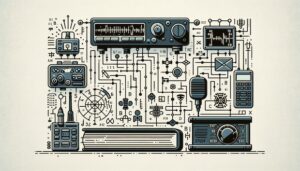Embarking on the journey to become a licensed amateur radio operator is an exciting endeavor that opens doors to a world of communication, innovation, and community service. The amateur radio exam, a pivotal step in this journey, assesses your knowledge and understanding of various topics essential for operating an amateur radio station effectively and responsibly. To aid in your exam preparation, focusing on practice questions can significantly enhance your grasp of the subject matter. These questions cover a wide range of topics, including FCC rules, operating practices, station setup, and basic electronics theory. Here are ten practice questions designed to test your knowledge and prepare you for the types of questions you’ll encounter on the actual exam. These practice items, along with detailed explanations, aim to bolster your understanding and confidence as you approach exam day.
#1. What is the maximum power output allowed for a Technician Class license holder operating in the 144 MHz band?
#2. Which modulation method is used for sending Morse code signals over the air?
Continuous Wave (CW) modulation is used for Morse code because it involves switching the carrier wave on and off, rather than varying its frequency or amplitude. This method is highly efficient for long-distance communication with low power.



